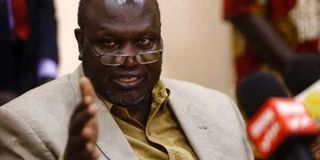Machar in Khartoum for ‘treatment’

South Sudan's former vice-president and rebel leader Riek Machar. PHOTO | AFP
What you need to know:
Khartoum says rebel leader’s health has now stabilised.
- Dr Machar was replaced by Taban Deng Gai as South Sudan’s first vice president after hundreds died in Juba last month in clashes.
KHARTOUM, Tuesday
South Sudan’s former rebel leader Riek Machar has arrived in Khartoum for “medical treatment,” the Sudanese government said on Tuesday, after he escaped to the Democratic Republic of Congo following deadly clashes last month.
Dr Machar was replaced by Taban Deng Gai as South Sudan’s first vice president after hundreds died in Juba last month in clashes between Machar’s forces and government troops.
“Sudan has received Riek Machar on humanitarian grounds and so he can have medical treatment,” Sudanese government spokesman Ahmed Bilal said in a statement.
He did not specify when Machar arrived in Khartoum, but said that when he arrived he was in need of “immediate medical treatment”.
“He is now stable. He will continue to stay in the country until he decides when to leave,” Mr Bilal said, without providing further details on the treatment.
After a 1983-2005 civil war, the mainly Christian south of Sudan split from the Muslim north on July 9, 2011, following a referendum six months earlier.
But in December 2013 a brutal civil war erupted in the world’s youngest country between supporters of President Salva Kiir and Machar, after Kiir accused his deputy of plotting a coup.
Ties between Khartoum and Juba have strained since then amid allegations that Sudan backs Machar in the civil war that has killed tens of thousands and forced more than two million from their homes.
Sudan’s announcement of Machar’s presence in Khartoum comes just a day after Deng wrapped up his first official visit to Khartoum.
Meanwhile, US Secretary of State John Kerry has called for the deployment of a 4,000-strong “protection force” to bolster the UN peacekeeping mission in South Sudan.
“There is absolutely no question that we need to move forward with the deployment of the regional protection force authorised by the UN Security Council,” Mr Kerry said after meeting with five regional foreign ministers in Nairobi.
Kenyan Foreign Minister Amina Mohamed also urged a speedy deployment. “When should it be there? Sooner rather than later,” she said. In the wake of fresh fighting in the South Sudanese capital Juba last month, Kenya offered to provide troops for a new force, approved by the Security Council on August 12, alongside Ethiopia and Rwanda.
The 4,000 new troops will join 12,000 already deployed as part of the UN Mission in South Sudan (UNMISS) which has been widely criticised for its serial failure to protect civilians.
Ms Mohamed said a “gradual deployment” would allow troops to reach Juba more quickly.
“Any number of soldiers that goes in in the name of a protection force would be welcome and would open the door to everything else,” she said.
Mr Kerry said the new force would only seek to improve security in Juba and allow for the implementation of a peace deal signed a year ago.





